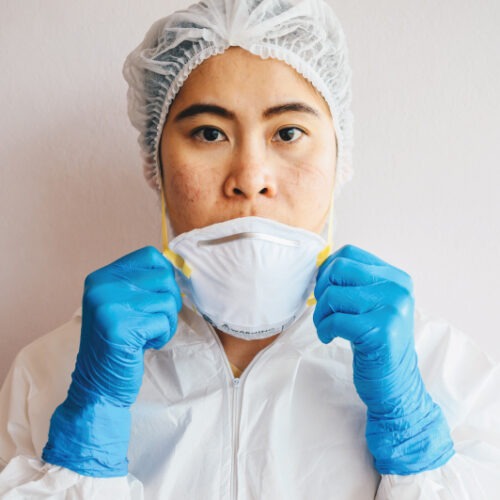
One of the outcomes of COVID-19 is the widespread use of masks as personal protective equipment (PPE). With their constant use, there are new skin concerns that are being noted.
“Masks are now being worn 100% of the time by healthcare professionals,” says Bruce A. Brod, MD, MHCI clinical professor of Dermatology at the University of Pennsylvania’s Perelman School of Medicine. “Prior to COVID-19, PPE was worn mostly during procedures or in cases where contact isolation for other infectious diseases was required. Now it is universal and we are also wearing masks outside of the healthcare facility out in the community.”
Skin Problems Mainly Due to Break Down
The skin problems with masks are mainly due to skin break down from friction, contact reactions, and high humidity. Erythema, papules, maceration or softening, and scaling are the concerns seen most often. Acne-like outbreaks are another possibility.
One study of 542 frontline healthcare workers (HCW) found that symptoms such as burning, itching, and stinging were found in 97% of the participants. The most commonly affected site was the bridge of the nose.
Different Masks Bring Different Concerns
“The N-95 mask can be especially problematic,” said Dr. Brod. “Because of the tight fit there is a constant pressure that can lead to skin breakdown. This, in turn, can cause skin to ulcerate, which is both painful and can lead to a bacterial infection.”
Surgical or procedure masks also have dermatological impacts. Many of the complaints are related to erosions and other pressure-related manifestations around the ears. There are also reports of similar presentations on the nose.
Some Tips
Dr. Brod has some tips to help alleviate the skin-related sequelae. First is to wash your face using very gentle skin cleansers. Sweating underneath the masks can add to the friction and pressure damage to the nose and cheeks. Maceration combined with friction causes breaks in the skin and increases the risk of infection.
“You should also avoid use of harsh soaps,” said Dr. Brod. “Avoid using exfoliants and harsh astringents during this time. When you do wash your face, don’t scrub. Rather, wash gently. I suggest at least twice a day as a good rule of thumb.”
Excess skin and dead skin cells build up more easily under the masked area. Washes containing low concentrations of salicylic or glycolic acids can help minimize the risk of acne or similar breakouts.
Because of the irritation from wearing the mask, the skin is not only more prone to acne, but also more prone to dryness. Dr. Brod suggests using a lightweight moisturizer. Helpful and reparative ingredients include dimethicone and hyaluronic acid. Stay away from those with heavy fragrances or botanicals to reduce the risk allergic reactions.
Barriers May Cause Mask Effectiveness Concerns
There have been some suggestions of using barriers on open areas of skin like Tegaderm. Adhesive barriers and thin dressings may be most appropriate to apply at the end of the work day.
“These have the potential to interfere with proper sealing of the respirator,” says Dr.Brod. “If you are using barriers during work, you should contact Occupational Health to refit your mask, especially those who are on the front lines.”
Simplify Cosmetic Regimens
For those who use cosmetics, Dr. Brod suggests simplify their regimens. Use noncomedogenic cosmetics that don’t block pores. He suggests a water-based product when it comes to foundations and concealers when possible since they wash off more easily with mild cleanser and water.”
For areas that are breaking down, applying petroleum jelly or similar commercially available petrolatum-based ointments may speed healing.There have been reports of COVID-related skin conditions that Healthcare workers need to consider when assessing their skin. Generalized, non-specific rashes, or a blue-red appearance on the toes with or without fever or other symptoms should be evaluated.
Stress Worsens Chronic Skin Conditions
Healthcare workers are facing unprecedented levels of stress, especially on the front line. Stress can worsen chronic skin conditions such as acne and rosacea. Talk to your healthcare professional about additional steps you may need to take.
In summary, “A good rule of thumb is to keep your skin care simple,” says Dr. Brod. “Keep it gentle and minimize the use of personal care products. Remember to apply sunscreen and use other sun protective measures when outdoors. Treat your skin kindly as it is a living organ, just like other areas of your body.”

